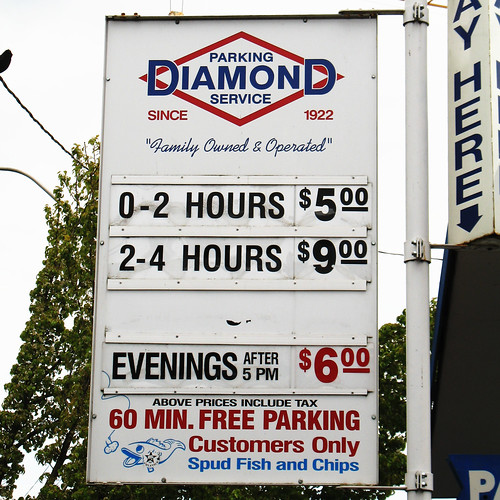Answer the Parking Question by Selling the Land

"Diamond parking" by smohundro
Sound Transit 3 is likely to spend nontrivial amounts of money on parking. The argument against agency-built parking is that it is among the least cost-efficient ways to spend money getting people to a station or bus stop. Furthermore, the land used for parking would best be used for dense development, which is revenue-positive. It creates ways for riders to live, work, and play within walking distance. Walking scales very well.
The soft version of this argument is that any agency-provided parking should charge a fee. This defrays some of the operating costs, discourages drivers that have other good options to free up room for those with none, and also encourages carpooling. With a properly set price, a pay lot should support more ridership than a free one.
The extremist pro-parking position, predictably held by the Seattle Times editorial board ($), is innumerate and silly.* But there are practical reasons to build parking. Many voters may see the train as useful only if they can visualize getting to it, even if they couldn't all use the finite number of spaces every day. Not every station area is ready for a burst of new development: parts of the Rainier Valley, in year 8 of light rail, are still waiting for it. So why not provide parking in the meantime?
Perhaps development is the highest and best use of station area land. Perhaps parking is. In either case, both sides should have confidence in their position, and let the free market decide. Build neither TOD nor structured parking; sell the land to private entities. This is the system Seattle stumbled into in the Rainier Valley, and parking is in a nice equilibrium as development climbs from zero.
If "no one" wants to live in an outer station near the freeway, then by all means store cars there for a few bucks. If patterns change in the coming decades, it will be much easier to convert that land to housing, offices, and/or retail if the existing parking is in private hands. Meanwhile, if people are vying to live in transformed neighborhoods, by no means should we prevent that with a parking structure. I trust the price signal much more than ST Board horse-trading to get the balance right.
* The Times's entire argument is that some people won't use transit if ST doesn't build them a space. But of course, if parking construction money leads to less rail, or fewer bus, bike, and pedestrian improvements, that will cause many more people to lose their access, including many with cars, as free parking at attractive locations is inevitably finite. As usual, people attached to their cars are "us," and people using other modes are the "other."